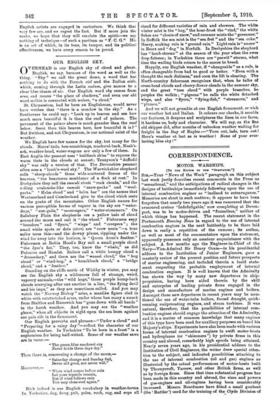OUR ENGLISH SKY.
OVERHEAD is our English sky of cloud and gleam. English, we say, because of the word as well as the thing. "Sky" we call the great dome, a word that has nothing to do with the French del and the Italian cielo, which, coming through the Latin coelum, give names to a clear blue chasm of air. Our English word sky comes from scan, and means "the place of shadows," and even our old word we/kin is connected with wolcen, "a cloud."
St. Chrysostom, had he been an Englishman, would never have written that "there is a meadow in the sky." As a Southerner he could say: "Look up to heaven and see how much more beautiful it is than the roof of palaces. The pavement of the palace above is much grander than the roof below. Seest thou this heaven here, how beautiful it is P" But Swithun, and not Chrysostom, is our national saint of the weather.
We English have few names for the sky, but many for the
clouds. Mares'-tails, hen-scratchings, mackerel-back, Noah's- ark, weather-head, water-wagons are only a few of them. In East Anglia the peasant uses "bullfinch skied" to express the warm tints in the clouds at sunset; Tennyson's "daffodil sky" was only a version of that. The Devonshire peasant often sees a "lamb's-wool sky." The Warwickshire shepherd calls " sheep-clouds " those wide-scattered fleeces of the heavens, "the beauteous semblance of a flock at rest." In Derbyshire they call the cumuli strati "rock clouds," and the railing avalanche-like cumuli " snow-packs " and " wool- packs." "Helm cloud" and "helm bar" are the names that Westmorland and Cumberland give to the cloud which rests on the peaks of the mountains. Other English names for various perceptible forms of vapour in the sky are " water- dcos," "sun-galls," "messengers," "water-streamers." On Salisbury Plain the shepherds see a yellow halo of cloud around the moon and call it "the wheel." Fishermen espy "breeders" and "flyers," " wisps " and "creepers"; the small white spots or dots (cirri) are "crow nests "—a true sailor term this—and the downy plume, rippling under the wind far away into the horizon, is "Queen Anne's feather." Fishermen at Robin Hood's Bay call a small purple cloud " the dyer's fist." They, too, know the "whale," as did Polonius and Hamlet. Sailors call a white humpy cloud a "dromedary," and there are the "weasel cloud," the "hog cloud" or "wind-hog," a "hunchback cloud," a "bridge cloud," and a "feather."
Standing on the cliffs north of Whitby in winter, you may see the English sky a wilderness full of strange, weird, vapoury animals,—the "wild hogs," those ptuple hump-back clouds scurrying after one another in a line, "the flying devil and his imps," as they are sometimes called. And you may watch the "Norway Bishop" arise, a manlike figure clad in white with outstretched arms, under whose ban many a smack from Staithes and Runswick has "gone down with all hands" in the harsh weather. And you may see the "weather gleam," when all objects in sight upon the sea loom against one pale rift in the firmament.
Our English proverbs and phrases—" Under a cloud" and "Preparing for a rainy day "—reflect the character of our English weather. In Yorkshire "To be born in a frost" is a euphemism for being half-witted. Some of our weather saws are in verse:— " The green-blue mackerel sky Never holds three days dry."
Then there is, concerning a change of the moon,—
" Saturday ehanz,e and Sunday full, Never did good, nor never will."
Moreover,— " When wind comes before rain Let your topsails remain, But if wind follows rain You may close-reef again."
Rich indeed is our English vocabulary in weather-terms. In Yorkshire, dag, doug, pelt, pelse, rouk, rag, and sops all
stand for different varieties of rain and showers. The white winter mist is the "hag," the hoar-frost the "rind," the white flakes are "clouts of snow," and summer mists the" gossamer." In Suffolk the sea mist is the "sea fret " and the "sea coke.* Heavy, soaking rain is "ground rain." Light rain is" smeer " in Essex and " dag " in Norfolk. In Derbyshire the shepherd has "lamb-storms" at the season of -the year when the ewes drop fatness ; in Yorkshire there are "peewit" storms, what time the wailing birds return to the moors to breed.
Happily, our English weather, if "changeable" as a rule, is often changeable from bad to good or better. "Even with a thought the rack dislimns," and soon the lift is clearing. The North-country fisherman recognises that, when he talks of cross-head clouds and cherry-flower clouds in the summer sky, and the great "tree cloud" with purple branches, he peoples the welkin ; "pigeons" he calls the white detached wisps, and also "flyers," "flying-fish," "streamers," and "plumes."
And we will not grumble at our English firmament, or wish our weather hot and Italian. It colours our cheeks, it moulds our features, it deepens and sculptures the linee in our faces, it hardens us, body and character. We will say, as the fine old skipper did, after months of unbroken weather waiting for freight in the Bay of Naples Turn out, lads, turn out! Here's weather at last as is weather I None of your ever- lasting blue sky !"










































 Previous page
Previous page